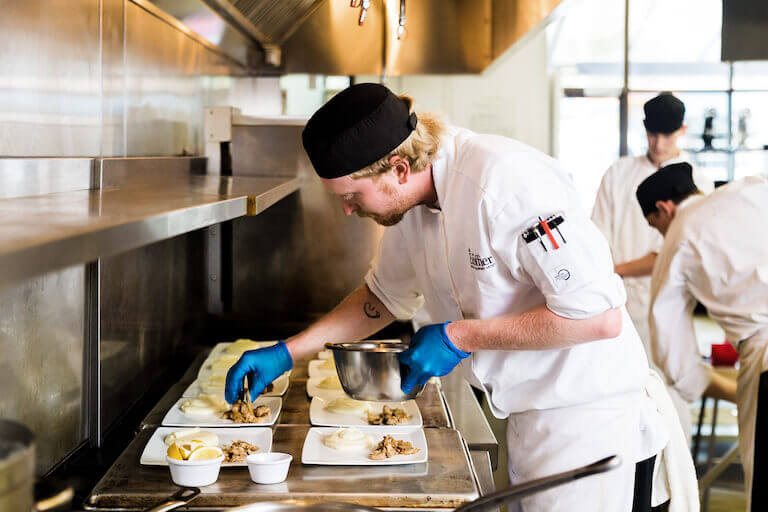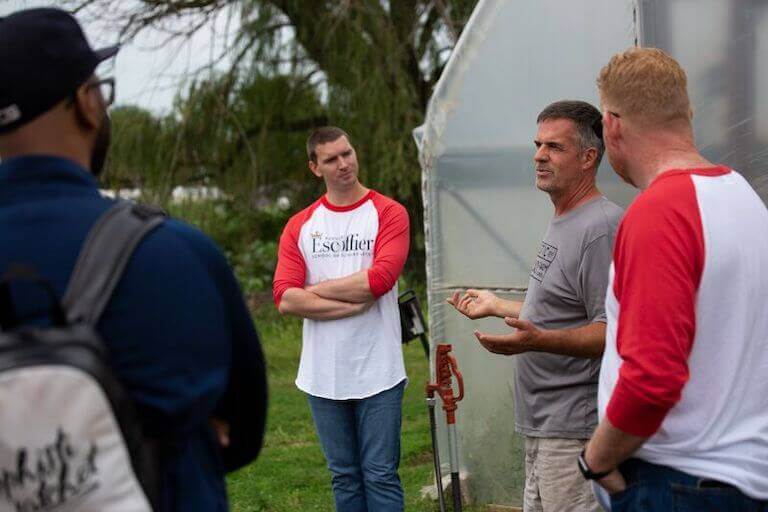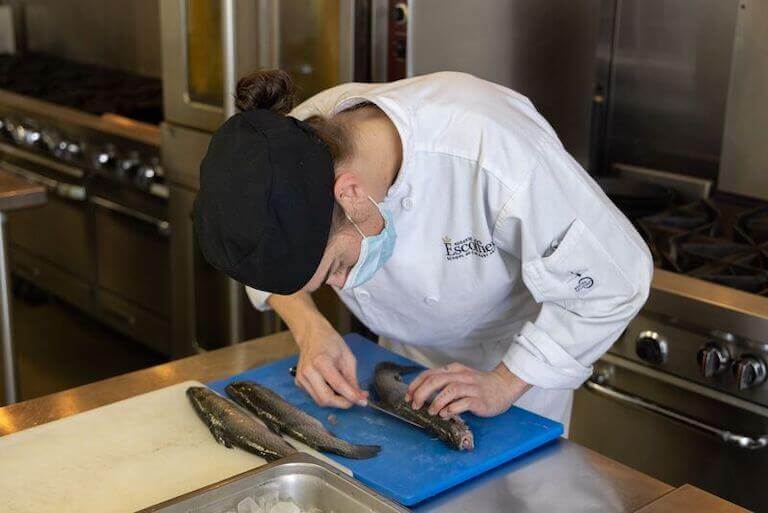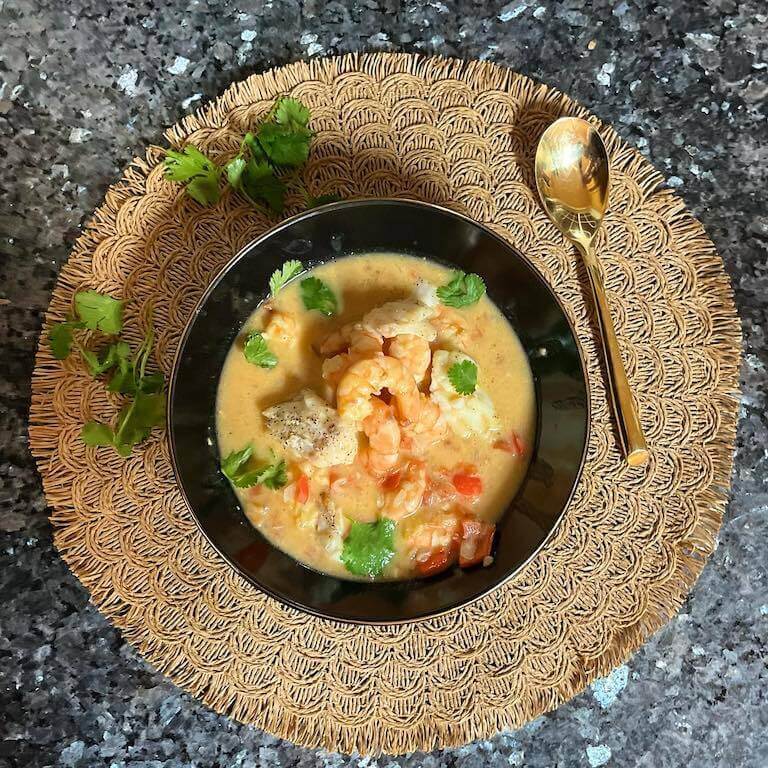Culinary school is a high-energy scene full of crisp white jackets, flaming stovetops, and expert Chef Instructors. But what is the experience of culinary school like on a daily basis?
Students may find that culinary school is far different from high school or traditional college. With a unique hands-on approach combined with classroom learning, culinary school is its own special place!
Students Focus on One to Two Classes at a Time
Students in Escoffier’s culinary arts degree programs often spend the full day on campus, completing their classes in 4- to 5-hour time blocks.* Unlike traditional college where students hop from class to class, culinary students usually take only one or two courses at a time.
In some programs, students may take two classes at a time. In Boulder’s Associate of Occupational Studies in Baking and Pastry, for example, which is known as the Associate of Applied Science Degree in Pastry Arts in Austin, students may take the Fundamentals of Baking and Pastry course concurrently with Menu Design and Management for six weeks, and then with Business and Professional Communications for six weeks.

Culinary School Balances Classroom and Kitchen Work
Culinary school is part classroom instruction, part lab work in the kitchen. This balance is important in imparting both knowledge (like food costs and menu planning) and skills (like knife handling and cooking techniques).
Some cooking courses are split between classroom and kitchen time, like Culinary Arts and Patisserie, which can consist of 45 hours of classroom time and 100 hours of kitchen time. Culinary Foundations is 70 hours of kitchen time, with another 75 hours of the total 145 hours in the classroom. And other classes, like Restaurant Operations or Culinary Entrepreneurship, are strictly classroom courses.
Students Can Practice On Their Own and Work on Group Projects
While each individual in the professional kitchen will have their own tasks to accomplish, it’s rare that a cook will complete an entire dish, start to finish, on their own. So while each student must practice their skills individually, they’ll also have to get used to working with others.
In on-campus culinary school, students can do both. Students may complete group projects where they must pull together with their teams to bake a showpiece cake or to complete a multi-course meal, learning essential skills for working in a team-oriented restaurant.
“There was never a dull moment [at Escoffier]. I didn’t know how to bake, I didn’t know how to cook. But at Escoffier, I was able to learn all the skills.”*
Norainee Rivas, Escoffier Graduate
What Might Happen Outside the Classroom?
Yes, culinary school has homework.
Students are assigned reading assignments so they can enter the next day’s lesson with the basics already in mind. This saves valuable classroom time and gives students a chance to expand their knowledge through more advanced conversation with their Chef Instructors.
Students may also be assigned other at-home work, like watching videos or, in some of the academic classes, writing essays and completing projects. In Culinary Entrepreneurship, for example, students can create a business plan for a foodservice business as part of their final project.
If students are in an on-campus program that includes the Farm to Table® Experience as part of their curriculum, they get the chance to participate in additional off-campus activities. Boulder and Austin campus students may spend portions of this course on a produce, dairy, or livestock farm, or with a local producer. This off-campus glimpse into food production can help students to appreciate the work that goes into creating the raw ingredients that cooks and chefs work with every day.

The Escoffier Austin campus also includes a school garden, where Farm to Table students might work on occasion. They can also opt to participate in Garden Club, helping with weeding, planting, harvesting, etc.
Tying It Together With the Culinary Externship
Most schooling takes place on campus (or online, if your program is one of our online degrees or diplomas). But at Escoffier, part of your education takes place somewhere entirely different.
The hands-on culinary externship is the final block in all Escoffier programs. These real work opportunities are designed to help students experience the culinary world outside of the academic setting. Working in a restaurant, bakery, or other related business, students get the chance to practice what they’ve learned and build on it with guidance from a new set of professional cooks and chef mentors.
Students are responsible for securing their own externships, but they may be able to get some pointers and valuable assistance from Career Services.

What About Online Culinary School Programs?
The fundamentals of Escoffier’s culinary school education are consistent between the on-campus and online programs (available through the Boulder campus.) Yet there are some key differences.
First of all, online students don’t have to complete their coursework within prescribed hours, the way they do on campus. Online students can watch lecture videos, do the assigned reading, and complete their cooking projects at any time of day or night, as long as they meet their program deadlines.
Online students still have a balance of classroom and kitchen work, just like on-campus students. And they still complete a hands-on industry externship. But since they can complete their education from home, that externship might be right in their hometowns.
Online students don’t have the same opportunity to complete group assignments as on-campus students, but the added flexibility of online school can make education accessible for thousands of students who otherwise couldn’t attend school at all!
“I love Escoffier! Online is a lot more hands-on than people think. My chefs are always right there to help me with any questions I have. And when they grade assignments, they see every step and can help determine what you did right, what you did wrong, and what you need more practice on.”*
Brianna Burroughs, Escoffier Online Culinary Arts Student

Bahian seafood stew by Escoffier online student Hanadi A.
What Is Culinary School Like? Come Find Out!
The culinary school experience can vary based on the school, program, and campus. But at Escoffier, students can find a curriculum designed to help prepare them for their first entry-level professional cooking job. Through a blend of lectures in the classroom, labs in the kitchen, and supporting reading, students get a multi-format school experience that supports a variety of learning styles.
Do you have more questions about culinary school or online cooking classes? Prospective students can tour our Austin and Boulder campuses to meet current students and Chef Instructors. Plus, our Admissions Department is here to help get you all the information you need.
To learn more about the culinary school experience, try these articles next:
- How You Can Get Into Culinary School
- Yes, Online Culinary School Works. Here’s How.
- Is Culinary School Necessary to Become a Chef?
*Information may not reflect every student’s experience. Results and outcomes may be based on several factors, such as geographical region or previous experience.



